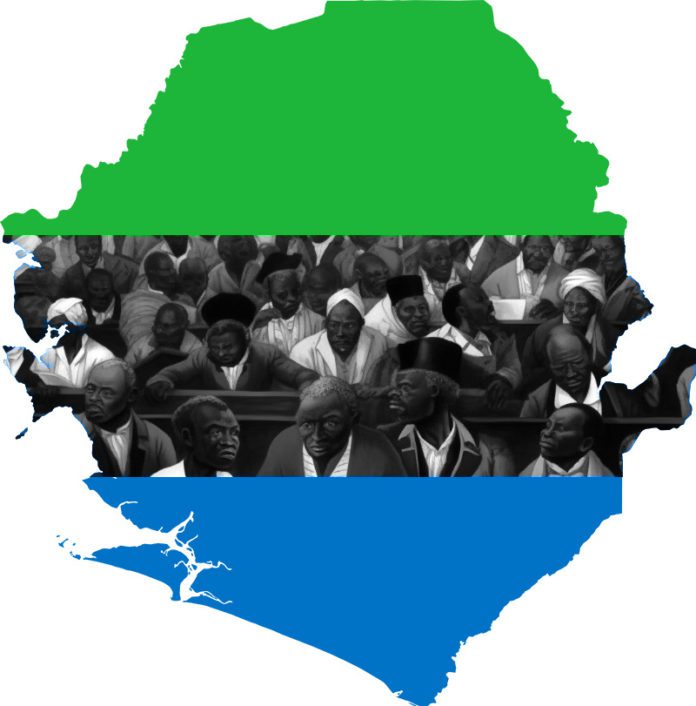
Why does Sierra Leone Need a Politics of the Person?
By Mahmud Tim Kargbo.
Political philosopher David Walsh highlights the givenness of the person in our hypercritical age.
Despite the many and all-too-apparent divisions in our politics today in Sierra Leone, there is one thing that seems to unite us: our near-national tendency to critique. We seem, almost by second nature, to begin an assessment of an idea from a position of skepticism until we decide for ourselves whether an idea has merit. The habit is hard-wired into the way children are taught from an early age: be a “critical thinker,” evaluate for yourself, and accept nothing for which you do not discern your own positive reason for assent. The ghost of late President Ahmad Tejan Kabbah is still very much with us: everything that can be doubted ought to be doubted. One must withhold assent until critical reflection has taken place.
To be sure, this approach has many important advantages. We ought to be critically evaluating public policies, the possibilities (positive and negative) of new technologies, and the actions of our leaders. Much of our progress in material and social well-being seems, at least partly, to result from this tendency. Certainly, the practice is essential for philosophical analysis—if everyone agrees all the time, philosophy becomes unnecessary. As John Stuart Mill so eloquently argued, only through challenging an idea can its validity be truly established.
What is open to question is the national application of the practice. The possibility of critical reflection on an ever-greater share of our lives has resulted in what might be termed an absolutisation of critique. Given the way things have developed technologically, morally, and politically in Sierra Leone society today, there is little left that seems to be an undisputed aspect of the reality within which all of our lives unfold, except the individual’s capacity to critique. This is one of the root causes of our fractured politics.
What happens when, through our ever-advancing mastery of technology and the hyper-politicisation of so many aspects of our lives, critical reflection becomes inescapable? For example, it is not outside the realm of possibility that our children will have to choose whether their lives will end in death. The possibilities of the metaverse may pan out to be equally challenging. Witness the new trend in gender reassignment and “nonbinary” sexual identities. There seems to be a smaller and smaller share of our lives that can be counted on as a given. Reality itself is becoming an object of our own creation. In this sense, we have all become reactionaries: nearly every detail of our lives needs to be critically evaluated and, if found undesirable, modified based on our critique.
Is there anything left that is simply given? In his most recent work, philosopher David Walsh has written extensively on the meaning of the person, laying the groundwork for a new vocabulary for addressing many of the philosophical, political, and ethical problems of our age. Most importantly, he urges us to reevaluate our politics using a revitalised language that reflects the reality of persons.
At its core, the reality of the person means an exploration of the meaning of encounter. Walsh asserts that one can never ask “what is a person”, but who is a person? This leads to the insight that prior to every political or ethical question lies a person with whom encounter is possible. Indeed, the person on the “other side” of the question is always the more fundamental reality. But encounters need not be concrete or face-to-face. Persons always transcend the encounter in some sense, never fully known to us. The person is not a problem but a mystery, a threshold to a deeper reality that we can never fully grasp.
This approach has implications for Walsh’s approach to philosophy: his method is synthetic, both in how he approaches individual philosophers and in how he engages with the Western tradition in philosophy.
Regarding individual philosophers, Walsh always considers the whole person behind the philosophical works with which he engages. Rather than simply casting aside difficult and problematic writers like Nietzsche, Derrida, or Rawls, he knits together a more holistic view, considering their contributions to our understanding of the person. Reading philosophy in this way means trying to penetrate through the sound-bite caricatures of these thinkers and get a sense of the person underneath. This adds up to the realisation that the issues that divide us as Sierra Leoneans can tell us something about ourselves: the deep alienation lying at the core of our modern society in Sierra Leone, our deep woundedness, and the sinfulness at the core of our being.
Of course, this does not mean that we should pass over the honest differences we have with these thinkers. Walsh is not a wholly uncritical philosopher. Rather, it means that he strives for a deeper understanding prior to any critique. There is a responsibility to the person prior to any critical engagement. For example, Marx becomes more than the philosophical precursor to the vast human tragedy of Communism: he provides clues what motivated so many persons to commit such evils as were (and are) witnessed under Communist regimes. What deeper longing lies beneath the penchant to turn other persons into political means? Thus, reading philosophers like Marx, Nietzsche, or Rosseau becomes a meditation on the deep longings of persons, tinged by an awareness of the evil that can result from those longings. Walsh shows the responsibility we have to understand the persons behind these philosophies while simultaneously offering a fierce critique of their shortcomings.
Walsh also applies this synthetic approach in his reading of Western philosophy, particularly in his reading of modern philosophy. Rather than assuming we took “wrong turn at Descartes Western philosophy as a whole, particularly in his reading of modern philosophy. Rather than assuming that we took a “wrong turn at Descartes” and that there is a deep pathology at the core of modern thinking, Walsh attempts to convey a sense of meaning over the long arc of the history of philosophy. As the title of one of his recent books suggests, modern philosophy ought to be understood as an unfolding of “the luminosity of existence.” The very real pathologies of the moment do not merit wholesale rejections of the cultural and intellectual currents that have brought us here; rather, these currents contain within themselves the resources for renewal.
All of this has deep implications for how we ought to approach politics in Sierra Leone. In the person’s politics, the fundamental issues become encounters in which the givenness of the person behind each question is given pride of place. It means a politics of subsidiarity, where problems are not seen as zero-sum clashes between rival national views but as opportunities for persons to engage as given. Rather than a tribal or regional power struggle between rival identity groups, a politics of the person would be one in which persons rather than labels structure relations: who you are in this fuller sense is immeasurably more important than what you are. Of course, none of this means that we ought to abandon those aspects of ourselves that outwardly manifest the mystery that lies behind our uniqueness. It simply means that they conceptualise these qualities as secondary to the basic, given the reality of persons.
A “critical” or “identity” politics in Sierra Leone can only complicate the possibility of encounter, reducing the person to a label that can never contain the underlying reality. Nearly every day, we see examples of how these alternatives turn our politics into ugly, zero-sum power struggles. But this need not be the case. David Walsh urges us to consider the possibility that no description matters more than “person.” The person, as given, is beyond all critique.



